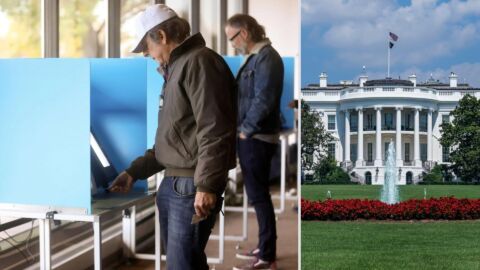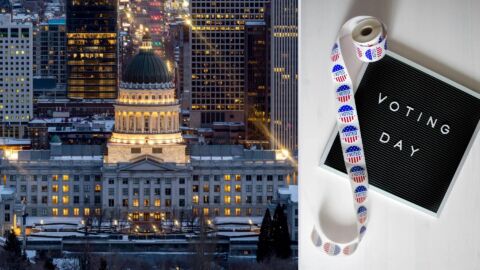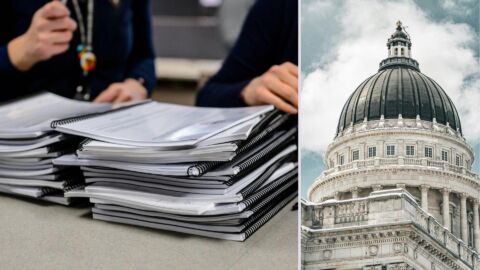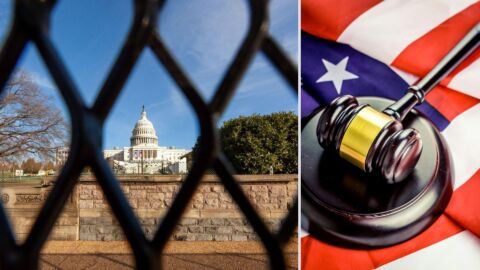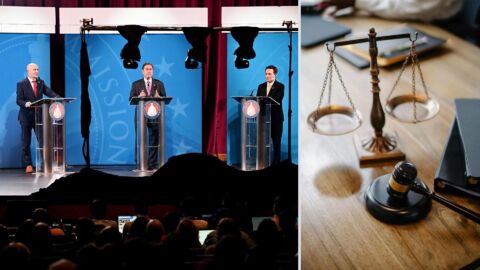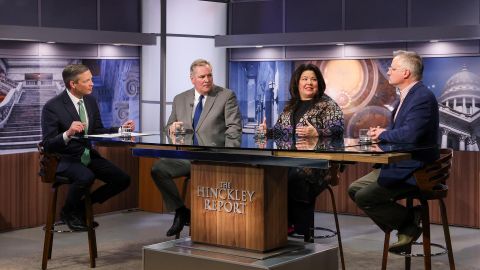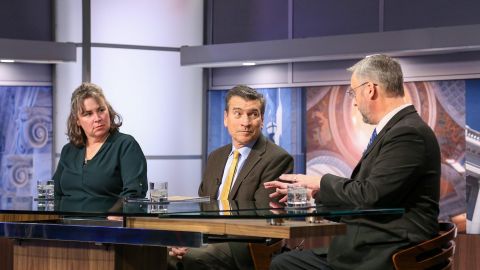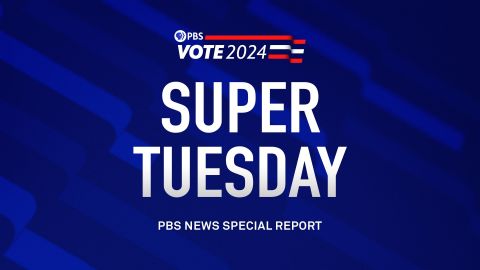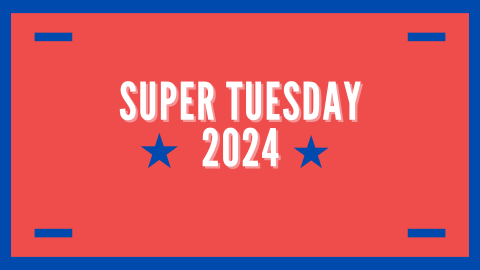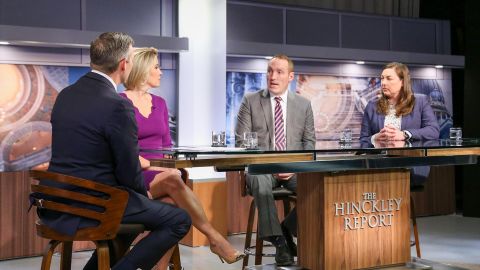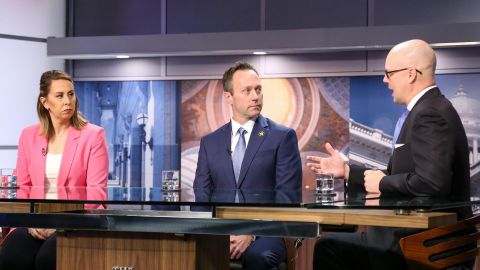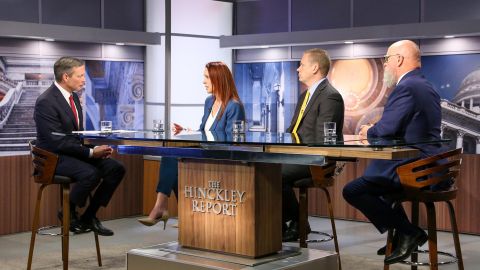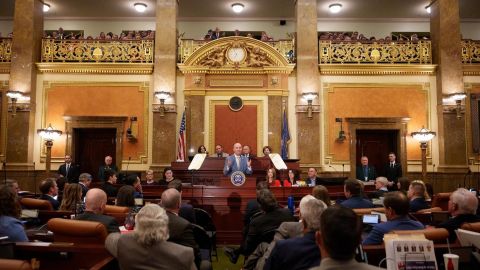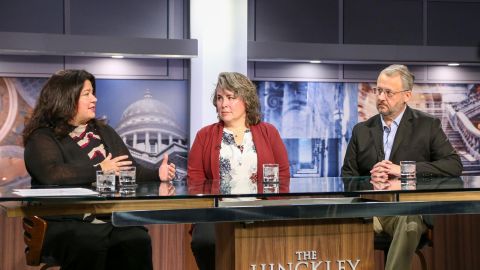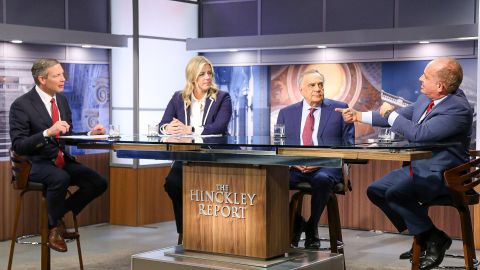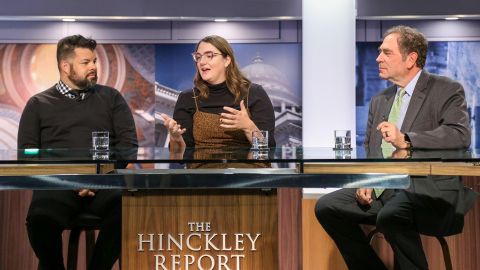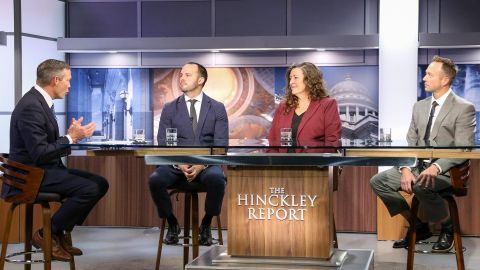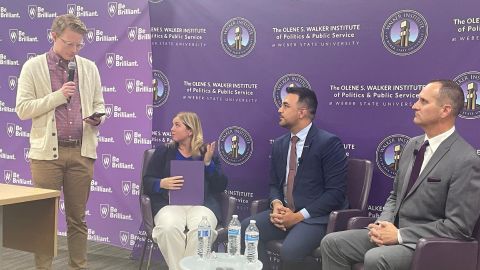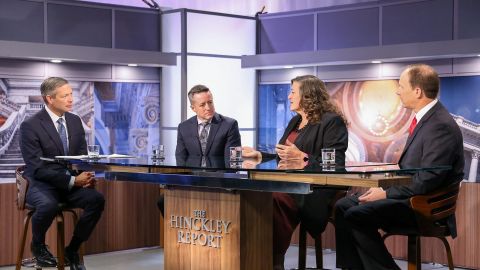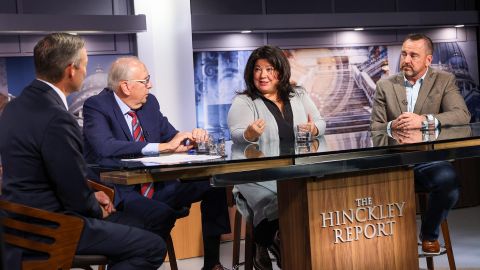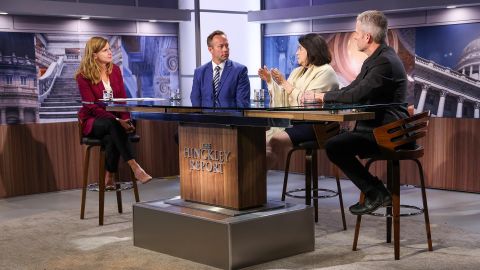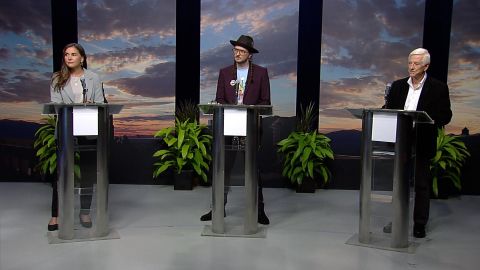♪♪♪ announcer: Funding for "The Hinckley Report" is made possible in part by the Cleone Peterson Eccles Endowment Fund.
Jason Perry: Tonight, on "The Hinckley Report."
New polling and a big announcement show what's in store for the 2024 election.
The state experiences significant pushback on its attempts to rein in social media companies.
And leaders release their priorities as they gear up for the legislative session.
♪♪♪ ♪♪♪ Jason Perry: Good evening, and welcome to "The Hinckley Report."
I'm Jason Perry, Director of the Hinckley Institute of Politics.
Covering the week we have Kim Bejorquez, reporter with Axios Salt Lake City; Dennis Romboy, editor with the Deseret News; and Chris Blake, partner with RRJ Consulting.
We're so glad to have you on the program.
This is an interesting time of year.
A lot of things are being set up for the next year, particularly when it comes to elections.
We're about to see a lot of campaigns launch.
A lot of people are looking into their races.
But I want to talk about a couple in particular, because right out of the gate at the beginning of the new year we're gonna get some announcements, is what we think.
Chris, let's talk about that for just a moment.
First, when it comes to the United States Senate, a lot of speculation that John Curtis may announce soon that he is going to jump into that race.
Talk about what that means and where he is if he does make that announcement.
Chris Bleak: Well, one of the big changes this year in elections here in Utah is we're gonna have the filing deadline at the beginning of January as opposed to the end of the legislative session in March, so it changes a number of dynamics in my mind.
I think there are a lot of people at the state level that don't particularly like it, but with John Curtis going to announce getting in, it's going to make for a very competitive Senate race, which I think is to be expected.
An open Senate seat is a big deal.
They don't come around very often.
I mean, for a long time, it was years and years that they didn't come around.
And so, I think we're going to see a very competitive race.
I wouldn't be surprised if there were other people that still are going to jump in because it's an open Senate seat at this point.
Jason Perry: Yeah, I wanna get to some of the polling on that too, but Dennis, this is such an interesting point.
When it used to be this filing deadline, you know, had after the session, it gave people a little bit of a cushion and a little bit of a worry on the issues that come up during the session, which, you know, people are always always trying to calculate their responses to things.
Talk about the impact that has.
Dennis Romboy: Yeah, now they have to jump out the gate right from the get-go, right from the first of the year.
They can't kind of test the waters or put their finger in the air and see what's happening.
So, they make a decision early.
And we've seen Brad Wilson's jumped in already, Trent Staggs is in already.
Brad doesn't have a lot of name recognition, I don't think, so we're seeing television ads already running from him.
Jason Perry: That's true.
Speaking of those ads, Kim, it's interesting because a PAC came out and started running some commercials to try to encourage John Curtis to run.
That same PAC did some polling recently about this race and gave John Curtis 40%, Brad Wilson 11%, Staggs 6%, 43% undecided, which is kind of huge.
But it's interesting to see those numbers ahead of an announcement that may happen soon.
Kim Bojorquez: I think if John Curtis were to enter the race, I think he would become a major candidate and a leading candidate because he has such great name recognition compared to the other candidates.
And as much power that the former House speaker has, It's very difficult for House speakers to gain name recognition when they run for office.
Dennis Romboy: Curtis does well with the general electorate, but he's not so much liked by state delegates.
And I would assume that there would be a primary in this race regardless of who gets into it.
Despite Curtis's-- I think he's well known and well liked in the third district.
It'll be interesting to see how much of that carries over statewide.
Chris Bleak: Well, I think we're gonna see something else that's unique.
We're going to see either a sitting congressman, a former state representative, or a sitting mayor become US Senator.
Here in the state of Utah, we have not seen that.
Congressmen don't become senators, sort of that tradition or what you see in other states, it hasn't happened in Utah.
So, I'm actually interested to see how that race plays out and somebody actually elevate from a current sitting political position.
Jason Perry: Chris, given your experience working with the House in particular, it's always interesting, what these candidates need is name ID, and sometimes people in the business say if they're an elected official at the state level, particularly in leadership, everyone knows them.
But that's not necessarily the case.
It takes a lot of work to get that name ID out there.
Chris Bleak: Yeah, and absolutely, and that's I think what-- back to Dennis's point about Speaker Wilson, he has--he got into this race early, trying to essentially clear the field or at least say, "I'm going to be serious about this."
And the thing that he has done particularly well is raised money.
And that is the key for any Senate race.
It's going to be an expensive race, particularly if John Curtis gets in.
I think John Curtis has proven that he can raise money as well, but Speaker Wilson has done a really good job of that and has been out.
We see already ads, but you see him out campaigning and meeting with people, so he is going to be formidable.
It's going to be an expensive and difficult race, regardless of who gets in.
Dennis Romboy: Yeah, I'd agree with that.
I think it's going to be competitive.
Both of the candidates are able-- those two candidates particularly are able to raise a lot of money.
Jason Perry: Yeah.
So, Kim, what's interesting is the domino effect of this.
If John Curtis jumps in the race, people are already talking about who will fill that particular spot.
And we do have a few people who are looking at that.
State Senator Mike Kennedy has already said he's gonna launch an exploratory committee to run for that.
We may see other people running for that as well.
But how competitive does that get within the party, the Republican Party in particular, there's the ones who have announced?
Kim Bojorquez: I mean, it's so rare to have an open seat that it's gonna welcome a lot of competition next year.
Jason Perry: Yeah, so it will.
And Dennis, it's interesting, because-- Dennis Romboy: Are the Democrats gonna make this competitive?
Are they gonna run in candidates that have a chance in any of these races?
I'd be interested to see that as well.
They recently announced they're kind of trying to reorganize and get on the same page as a party here in the state.
You know, it'd be interesting to see if they can run any competitive candidates in these races.
Jason Perry: Yeah, that's true.
Kim, speaking of the Democrats, when it's looking at the governor's race, we do have a high profile Democrat who was announced in Brian King, who's been in the House, the State House of Representatives, for a very long time.
He's announced, and along with Derek Brown.
Talk about what you're hearing when it comes to that particular race, because the AG's race is gonna be wide open.
Kim Bojorquez: Yeah, I mean, when King announced recently that he was running for governor as a Democratic candidate, he told me that he was really running to stand up for reproductive rights in Utah, and he also said that he is running against government overreach.
And even though he has a long shot, you know, he's still committed to doing it.
I believe it's been over about 40 years since we last elected a Democratic governor, and it is a long shot campaign, but it'll be interesting to see how that plays out.
Chris Bleak: Well, one of the things-- I thought in 2024 was gonna be relatively staid here in Utah in terms of electoral, but what we've seen just in the last couple of months, obviously Senator Romney has announced he's not running, which the domino now of John Curtis not running, AG Reyes not running, if John Dougall announces for Congress, you open up a seat there.
So, we're gonna see a lot of shifting around, much more than I originally thought we were going to see, and some opportunities for people to run.
AG, for example, is a spot where people can get engaged there, and, you know, really open up some opportunities.
Once again, that domino, you know, a lot of times AGs become governors.
That hasn't been the case here in Utah, but maybe some people will be looking at that as an opportunity to kind of step stone into something else as well.
Dennis Romboy: We just elected Celeste Maloy in the second district, right?
She has to run again in 2024 immediately, basically, think about reelection already.
She already has a Republican challenger.
So, a lot of these seats are attracting, I think, a lot of candidates.
Jason Perry: So, on the national level, it's interesting because we're talking about the presidential race.
Utah will be watching closely.
We're gonna host one of those debates for president.
But what's interesting now is some activities in D.C. Kim, let's talk about that.
First, there was a vote this past week to authorize an impeachment inquiry from the House Republicans, United States House of Representatives.
Talk about what's happened there a little bit too, because it looks like even though all of our delegation voted to proceed, it wasn't because they felt like necessarily anything has been proven.
Kim Bojorquez: Yeah, and I think that's one of the major criticisms that launching this impeachment inquiry has garnered.
You know, even Mitt Romney has come out to say that this is-- there isn't a lot of proof behind this, or there isn't a lot of evidence of wrongdoing based on this impeachment inquiry.
Jason Perry: Yeah, Dennis, how does this kind of influence this race going forward?
Because there was a time when you didn't talk about impeachment so much, but we talk about it a pretty good amount now.
Dennis Romboy: There's some might argue that this is a little fuel and help President Trump.
A lot of these criticisms of him, he's somehow-- people don't buy into that.
And so, he's been able to kind of use that as fuel and propel his candidacy, even.
Maybe it works against the Democrats in some ways as well.
Jason Perry: I'm kind of curious about a recent decision in our neighboring state in Colorado, Chris, to see if it fuels that a little bit.
It was the Colorado Supreme Court this week ruled that Trump is not eligible to hold office there, will not be on the ballot.
People immediately started talking about why is that the case there, and then what does that mean for us here in Utah?
Chris Bleak: Well, I think the Colorado Supreme Court case is interesting for a couple of reasons.
The 14th Amendment, which was put in post-Civil War, late 1860s, essentially bars anyone that has been involved in an armed insurrection or riot against the government of the United States.
Obviously put in because a number of Southern states at the time were sending Confederate generals and elected officials to Congress, and so that amendment was put in place.
It's only been used one other time before.
It was in the 1920s, I believe, a socialist candidate was barred from Congress, and ultimately, the U.S. Supreme Court got involved in that conviction, and that individual then went on to win a couple of terms in the US House.
So, I guess what I'm saying is, the US Supreme Court is going to play a role in this 2024 presidential election, whether we like it or not.
And one of the first issues they're going to decide are issues around President Trump, both immunity, this issue of whether the 14th Amendment-- I'll even make the joke, is it-- do you read this as an originalist and say it bars anyone that's been involved in an insurrection?
And if it does, that's, I think, potentially a problem for President Trump.
Jason Perry: Well, it's so interesting, Dennis, because several of these challenges are certainly on their way to the United States Supreme Court.
Dennis Romboy: Yeah, and I think that the Trump team is trying to do in everything they can to delay any kind of decisions in these, you know, until the 2024 election is over.
I think that there's some urgency into the Colorado decision going to the Supreme Court and having a decision on that, you know, first and foremost.
Jason Perry: What's interesting, Kim, is, of course, our Lieutenant Governor Deidre Henderson was asked about this.
What does this decision in Colorado mean for us here?
And she said it means nothing necessarily, was her response.
And that's because we pick our candidates through the parties themselves.
Kim Bojorquez: Yeah, and I think what's interesting-- and even though this might not impact Utah right now, you are-- I think you are gonna see Democrats from a variety of states use this as a strategy to get Trump's name out of the ballot.
For example, California's lieutenant governor recently this week sent a letter to her secretary of state asking to remove Trump off the ballot because of this 14th amendment clause.
Jason Perry: Exactly right, and our own governor weighed in this week.
Dennis, I want to read this to you and get a comment from what you are hearing out there in the community about this particular approach to this issue.
This is from Governor Cox this week and his press conference.
He said, "I thought Donald Trump did some good things as president, I thought he did some terrible things as president, and I don't think he should be president again, I really don't.
But I hope that the people of the United States will figure that out and can make those decisions.
That's a better way to decide this issue."
Dennis Romboy: So, I think he's saying this should not be in the hands of nine justices to decide who's on the ballot and who's not.
That the people, the voters, that's the ballot box, and that's who decides whether someone should be elected or not.
It should not rest with the courts.
Jason Perry: Interestingly, to the court question again, a deal was brokered this week.
Chris, talk about this, because RFK Jr., running as an independent candidate, only needs in Utah 1,000 signatures to get on the ballot in Utah, and there were some pressing deadlines, and he kind of pushed back on the state, and he was given a little more latitude, a little more time.
Talk about first that bar, that 1,000 signature bar, and why you think that more time was given to him.
Chris Bleak: Well, I'll say a couple things.
One, the bar here in Utah is pretty low to qualify as an independent candidate for the presidential ballot.
I believe it's 1,000 signatures, which is relatively low threshold to get on the ballot.
The only thing that bugs me is why weren't they paying attention to this?
I mean, if you're running a presidential campaign, these types of things need to be paid attention to and done.
And to me, it doesn't seem that difficult to do.
That being said, it's clear that Lieutenant Governor Henderson saw that there was some weakness in that deadline and is clearly working with the legislature and others to extend that deadline to March, which seems like a reasonable compromise.
I know that there are other candidates out trying to get signatures for state legislative races, and they would have been impacted by that early January deadline, and so it seems reasonable.
But on the flip side, it's a RFK Jr.'s campaign, get your stuff together and have that figured out.
Like, if you know that there's 1,000 signatures needed, you need to be out here in September and October getting those signatures and not trying to figure out in December why you can't get those signatures.
Dennis Romboy: And I agree, 1,000 signatures is a pretty low bar to get on as a presidential candidate.
Some other states have very high bars.
California, for example, you need 200,000 signatures.
In Florida and Texas, it's more than 100,000 signatures.
And there's some other stipulations in some of these states to get on the ballot.
So, it's much more difficult.
And as an independent candidate, to have any get on the ballot in 50 states to even have a chance is very, very difficult.
Jason Perry: It's interesting that the comment from Lieutenant Governor Deidre Henderson was she made this decision in the spirit of affording every reasonable opportunity for unaffiliated presidential candidates to participate in our general election.
Seems like she was opening that up, even though the bar is much higher for Republican and Democratic candidates.
Dennis Romboy: There's some other obscure independent candidate where the challenge is-- I'm not sure that that access would be granted as quickly.
Jason Perry: Can we talk about social media for a second?
All these candidates are looking at it, but the state of Utah is clearly looking at the impacts of social media on our kids in particular.
And this is starting on March 1, which is why it's interesting, Chris, to see how this legislation would pass.
These are bills already that have been passed by our legislature.
Parents must give permission for a minor to open a social media account, and platforms must verify the age of all the users to maintain the account.
That's part one.
Part two is a state mandated curfew.
This is from 10.30 p.m. until 6.30 a.m. unless authorized by a parent.
These are some pretty restrictive laws, and it's been challenged this week.
Chris Bleak: Yeah, absolutely.
That's a rule also in the Blake household.
You've got to turn in your phone by 10:30.
You can't get it until the morning.
So, I agree with that, but NetChoice, an Internet advocacy group out of Washington, D.C., filed suit against this.
I think the legislature knows that the lawsuits were coming, but also recognizes the need to make some changes to these laws, which they intend to do this upcoming legislative session.
There was a case in Arkansas where the district court there enjoined similar type laws and have given sort of a roadmap on what the state of Utah is going to need to do to tweak the law to potentially withstand that legal problem that are being raised in terms of First Amendment issues.
So, I think absolutely we're going to see some changes, but I also believe that the political establishment here in Utah is pretty squarely behind the idea that we need to do something, and we're gonna see more of that rather than less of it this year.
Jason Perry: It's interesting, Dennis, the governor was not surprised at all that these challenges were coming.
In fact, allocated money in his budget to help fight the lawsuits.
Dennis Romboy: Yeah, I think he's all in on this.
I don't think they're gonna back off on this.
I wouldn't be surprised if the courts stay these laws for a period of time and we battle this out in court.
And, you know, Governor Cox has also gone so far as to say he wants to ban cell phones from classrooms now too, which will be an interesting-- more of a local issue than a national issue.
Jason Perry: I wanna talk about that for a minute, Kim, because Governor Cox has weighed in on this.
Of course, this is NetChoice that filed this lawsuit against the state, and it did get to this cell phone issue for sure.
In fact, Governor Cox this week said that he was going to send a letter to every principal, every school in the state asking them to take measures to prevent smartphones from being in the hands of kids during class time.
This certainly seems like an issue that people are starting to talk about, not just the governor, but through our legislature.
Kim Bojorquez: Yeah, I definitely see this issue being one of Governor Cox's marquee issues.
I think from the beginning he knew that this legislation wasn't gonna be foolproof and that it was gonna prompt and invite legal challenges from our social media conglomerates, so it's not a surprise that, you know, as we wait for this law to go in effect in March, it's not a surprise that he's already reaching out to schools, to principals, to try to limit cell phone use in the classroom.
Jason Perry: So, this issue, Chris, is not just here in the state.
Senator Romney, this past week, is also asking federal agencies to look at the impacts, the mental health impacts, and the achievement aspects of schools when cell phone policies are not restrictive.
Chris Bleak: Well, we've certainly seen the pendulum swing on this issue.
Not that long ago it was how can we incorporate more technology into the classroom to better prepare our students.
We're certainly seeing that shift to we need to take out some of this technology and focus in a different way.
I think there's probably somewhere in the middle where this will swing.
I think one of the people that will have more problems with technology in the classroom are parents.
There's an expectation that they can get in touch with their kid or make contact with them, and so there's gonna be concerns there.
But there clearly needs to be a balance in terms of what is allowed, but also what are students doing in the classroom?
You know, are they being distracted or are they losing attention because there's too much technology or their phones are causing a problem within the classroom?
Dennis Romboy: I think that's what Senator Romney wants to get to in studying that issue.
Is it actually a distraction?
Is it impacting, impeding learning in the classroom?
Are kids, you know, spending time playing games on their phones and not using them for any kind of educational purpose?
I think there's gotta be some kind of a balance there.
I remember some years back, I think there was an effort in the state to put, I think it was, like, an iPad in every kid's hands in the classroom, right?
And now, like Chris said, we're kind of trying to pull that back a little bit, because we've seen what can happen when kids get too distracted.
Jason Perry: It seems from our elected officials, though, they're trying to prove the case one way or the other.
Are we going to see some legislation potentially on this issue?
Dennis Romboy: I would think so.
It's interesting to me that why not leave this up to the individual schools or individual school districts?
You know, the legislature's always involved in these kinds of things.
Maybe there is a purpose for having the phone in particular instances in the class, and it's useful for learning.
You know, I don't know.
Chris Bleak: Well, and I hope that the data, whether that come from a federal level or even a state level, could prove a useful baseline for principals and teachers to make decisions about their classroom.
I think technology is going to play a role.
We're not going to remove phones.
These kids, you know, are using them.
And maybe there are better ways we can utilize it, but finding a balance also in terms of what does the data say on when it should be used or not be used or how best to use it.
I mean, those things I think would be really valuable to those districts and teachers.
Dennis Romboy: That would be very helpful to know exactly what's happening with the kids in school with technology.
Jason Perry: This one sure seems like it's coming.
Maybe for this session we'll talk more about this too, because we're starting to see the priorities get put out, you know, lists are being put out.
And Kim, this week the Senate put out their priority list.
It's interesting, because the top three things were these.
The first one is energy independence, number two is optimizing water supply and infrastructure, and affordable housing.
These are some pretty big issues.
What are you hearing about the Senate and maybe the people that you interviewed too, about these being the big ticket items for the Senate this year?
Kim Bojorquez: Well, housing affordability is a big issue in this state.
You know, you can't really make the same wage that we used to and be able to afford a down payment for a home.
And, you know, Utah prides itself on its big families, on being family oriented, and if young couples or individuals aren't able to buy their first home, it's definitely something that the legislature wants to focus on.
Jason Perry: Yeah, it's a-- go ahead, Dennis.
Dennis Romboy: The governor's proposed to put what, $150 million into programs that help foster the construction of starter homes and build up the first time home buyer program, which already had $50 million to begin with.
And I think that's been a fairly successful program in the past year.
Those are some of his efforts, and we'll see if the legislature is in line with as much as he's asking for for those programs.
Chris Bleak: Well, and I was gonna say, one of the things you mentioned there, energy independence, President Adams and Speaker Schultz have talked about the importance of having low-cost reliable energy and what an impact that has had on the economic development and growth of this state.
And that is an issue that they've felt very passionately on.
You're seeing some of that on the impact of IPP and what's happening in there.
Jason Perry: Talk about that power plant.
Chris Bleak: Yeah, absolutely.
I mean, IPP is a power plant in rural Utah that largely ships its electricity to California and, you know, is looking at making some changes in terms of its coal supply, fuel supply, and how it's fed.
And that has not gone over well in rural Utah.
But I think we're going to see continued focus on energy independence in Utah.
Do the states to our left, California, Oregon, Washington, are they going to determine Utah's futures as it relates to its power supply and what they're able to do, or is Utah going to take more control over its power, future, and destiny?
And I think that right now, the political establishment in Utah very much wants to make a change and try to take more control over what happens with its power supply.
Jason Perry: In terms of power too, Dennis, because you all mentioned this idea on this affordable housing too, it's interesting to see the legislature and the governor putting this as one of their top priorities.
This has historically been something that kind of happened at the local level on this, but it's certainly not the case now.
Dennis Romboy: Just because it's so impactful statewide.
I mean, it's like Kim was saying, it's so difficult on a, you know, a median income to buy a home.
And I think Governor Cox talked about home ownership is one of the keys to having a successful community, a society, to be able to own your own home.
I don't know if that's true or not.
I've seen thousands and thousands of apartment buildings and townhomes going up too.
And younger people seem content to live in those types of environments.
So, I don't know how much, you know-- there is demand for home ownership, obviously, but I don't know how much among the younger generation now from just what I'm seeing out there.
Jason Perry: What other issues do you see in our final couple of minutes here that you see coming for this legislative session?
What do you see coming, Kim?
Kim Bojorquez: Well, definitely, I do wonder if Utah may follow in the footsteps of Florida when it comes to stopping state dollars being funded into diversity, equity, and inclusion programs in higher education campuses.
We knew that there was an Ogden senator who proposed a bill last year and quickly pulled it.
But I think we're definitely gonna see challenges to DEI programs in universities, which are intended to close gaps in college attainment among people of color, among groups that have been historically marginalized.
And thinking about Governor Cox's recent comments on DEI programs, he accused them of politicizing issues and causing division, so it'll be really interesting to see how universities and public higher--or public colleges respond to those attacks.
Jason Perry: That one's definitely coming.
Thanks for that one.
How about you, Dennis?
Dennis Romboy: I'd be interested to know if there's gonna be a tax cut.
I think legislative leaders wanna offer a tax cut.
I don't know if the state revenues are as robust as they have been in some of the past years.
And so, that'll be an interesting issue to see if there's another tax cut.
Jason Perry: Yeah, it's interesting, because we haven't seen those budget numbers, but they're certainly talking about that.
Chris, your issue, and then any last end of year comments to those as we get ready to start the legislative session.
Chris Bleak: Well, I think there's some significant issues that-- some of which we've talked on energy independence, housing affordability I think are gonna be important.
Great Salt Lake remains an important issue, and I think that's a place where the state has done a great job and needs to continue to focus, making sure that that asset is protected and well cared for.
And I think we're gonna see water generally continue as a theme as well as the tax cut.
I just think that what's important is, you know, the state continues to grow and finds way to make an environment that's positive and mobile here in the state of Utah.
Jason Perry: Thank you so much for your insights this evening.
Can't wait for this next year.
And thank you for watching "The Hinckley Report."
This show is also available as a podcast on pbsutah.org/hinckleyreport or wherever you get your podcasts.
Thank you for being with us.
We'll see you next week.
♪♪♪ ♪♪♪

